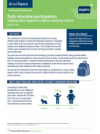These reports are part of the Growing Up in New Zealand longitudinal study and were prepared by the University of Auckland. They focus on the children from the study as they get ready to start school.
The biggest shift for most children is that they now attend early childhood education, and most are reported to be generally happy and healthy and spending time getting to know their peers. This means that we also see greater employment of mothers, leading to improved economic circumstances for these households.
Nearly half of this generation of mothers live in private rental accommodation and experience multiple changes of address. The effect of this on access to services needs further exploration.
We also see:
- High prevalence of obesity: at age four, 14 percent of the children were classified as overweight or obese. Interestingly, for such obese children, a majority were perceived by their mother to be of normal weight.
- Families moving homes frequently, with half of the children experiencing one or more residential moves since the age of two.
- The increasing number of children living with a single parent as the cohort gets older.
- A greater proportion of Maori children living in single-parent households compared to other ethnic groups. Previous research by Superu identified that these families tend to face greater financial stress which impacts their ability to function well.
- One in five mothers experience depressive symptoms during or since pregnancy.
- By the age of four, 97 percent of children spend time away from their parent, such as in early childhood education or organised home-based care.


